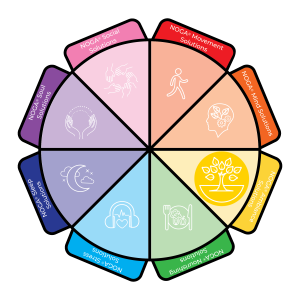What Doesn’t Kill You…

The idea that what doesn’t kill you makes you stronger is attributed to the philosopher Friedrich Nietzsche. While it may sound like a pithy inspirational meme, the phenomenon is a well-established scientific concept called hormesis which is seen in many arenas such as biology, botany, physics, chemistry, and more. The Greek word hormesis means eagerness or being in motion in a way of urging. The word hormone is from the same root. Hormones are biochemical substances that flow “eagerly” in various directions throughout the body.
Hormesis is the idea that low doses of a challenging, harmful, or painful agent can stimulate the organism’s ability to adapt and respond, resulting in an overall improvement in function. In other words, a little bit of stress can be good for you. Think of exercise (or you may prefer not to 😊). When we are deconditioned, beginning a new exercise routine may cause muscles to tear a little bit and build up excess lactic acid causing pain. However, gently re-“injuring” the area, day by day, builds the muscle so that it becomes stronger and stronger. Additionally, moderate exercise that challenges the body is not only good for your muscles, it can improve cardiovascular health as well. However, we should be aware that excessive exercise can lead to injury and negative health outcomes.
Examples of hormesis can be found in a variety of contexts, from physical exercise to plant growth or psychology. For instance, plants exposed to low levels of toxins can produce more robust roots and leaves, but high doses can be lethal. It has been found that plants that grow in challenging conditions such as deserts or extreme cold have more potent phytochemicals in them. So, hormetic stressors are environmental factors that stimulate an organism’s adaptive response. In some cases, hormetic stressors can improve an organism’s health and lifespan. At the same time, when it is either too little or too much it may become detrimental to the organism. The “Goldilocks” realm, right in the middle is called the “hormetic zone.” This is a principle that the famous scholar (and doctor of the Saladin, sultan of Egypt), Rambam in Hilchos De’os (1:4), guides us. (CLICK HERE to read De’ot – Chapter One)
In the professional and career realm, hormesis can be seen in the concept of growth mindset, like a springboard that goes down to spring much higher. Individuals who view challenges and setbacks as opportunities or learning and growth may be more likely to develop new skills and succeed in their careers. However, individuals who are too risk-averse or unwilling to take on new challenges may find themselves stuck and stagnant.
In the context of mental health, hormesis can be seen in the concept of resilience. Individuals who face moderate levels of stress or adversity throughout their lives may develop coping mechanisms and psychological tools that enable them to better handle future challenges. However, prolonged, or severe chronic stress can lead to mental health issues such as anxiety and depression as well as medical problems. In healing as well as spirituality, this phenomenon is called “Post-Traumatic Growth (PTG).” If you have followed this blog, you may be aware that I am amid my own blessed PTG experience. (CLICK HERE) These concepts are in perfect alignment with the Zohar’s principle of Yerida l’tzoreich aliyah. (CLICK HERE to read Yeridah (Descent) for Aliyah (Ascent))
This “science” talk is not only supported in research, it can be practical for all of us as well. The idea that what doesn’t kill you can make you stronger is indeed real. Whether in the context of physical or mental health, professional growth, biochemical, or natural ecosystems, and more, moderate exposure to stress and adversity can lead to improved adaptation and function. To apply this to our own lives, it’s important to remember that the dose makes the poison – too much stress or adversity can have negative consequences too. Balance is the key. We can more mindfully take on challenges to benefit from a balanced approach that stretches us toward growth, instead of unwittingly causing unfortunate self-harm.
Blessings of success approaching your helpful “Hormetic Zone.”
We love hearing from you, please feel free to leave your comments below.
With Gratitude,
Rus Devorah



